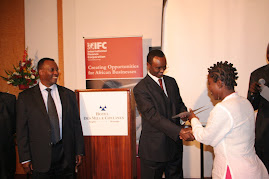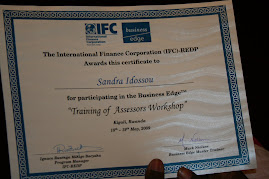
HERE COMES ANOTHER EDITION OF THE SERVICE MAG
Thursday 19th of August, 2010
WEEKLY » Business Times » Here comes another ‘service magazine’
-->
Here comes another ‘service magazine’ By Sandra idossou
For those who don’t know” “The Service Mag”, is a free quarterly magazine in English, French and Kinyarwanda distributed to service people in Rwanda.
It is distributed in hotels, restaurants, banks, hospitals, ministries, travel agencies, embassies and many more service providers both in the private and public sectors.
The main objective of ‘The Service Mag’ is to sensitize and educate both service providers and customers. The magazine has articles on Customer Service, Human Resources, Sales, Personal Development, Grooming and many other more.
The fact that the magazine is written in a simple language and filled with many attractive images makes the reading interesting for both top managers and the small clerk.
The first edition was launched in April 2010 with 5000 copies distributed freely all over the country including all provinces up-country. Education is one of the important ideologies I wholeheartedly believe in.
Education as we know encompasses teaching and learning specific skills. It is something less tangible but more profound: the imparting of knowledge. And that is the reason the motto of the Service Mag is based on Sir Francis Bacon’s famous quote “Knowledge is Power”.
The issues concerning poor customer service in Rwanda is often caused by the lack of exposure or knowledge. Many behave the way they do because they do not even know what is expected of them.
Good customer service is also not the sole responsibility of certain companies alone. If we want service delivery to improve, we should all be ready take concrete actions and be collectively responsible.
The Second issue of The Service Mag that will be launched this Wednesday June 30th 2010 is once again a compilation of several educational articles.
This new issue has a focus on The Public Sector as many still think that customer service concerns only the private sector. Watch out for the two interviews and see what is being done in public institutions.
This issue also has a new column called “where we’ve been to…and how we were treated” where customers share with readers their positive and negatives experiences or simply what they are expecting from service providers.
I must admit here that at several occasions, The Service Mag team had wanted to stop the project at the lack of support from many organizations. For those who do not know, each edition needs the financial support of local companies so that it can be made free to readers.
Writing here about the challenges in getting this support will require several long chapters that you may not want to know. But the fact here is that it is very discouraging and demotivational.
Thanks to the fifteen organizations that have made this issue possible, you can have your free copy from Wednesday June 30th 2010.
sandra.idossou@sheiconsulting.com




































